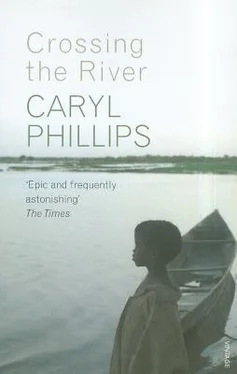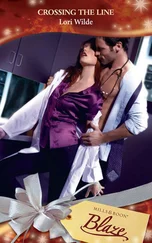Caryl Phillips - Crossing the River
Здесь есть возможность читать онлайн «Caryl Phillips - Crossing the River» весь текст электронной книги совершенно бесплатно (целиком полную версию без сокращений). В некоторых случаях можно слушать аудио, скачать через торрент в формате fb2 и присутствует краткое содержание. Год выпуска: 2006, Издательство: Vintage, Жанр: Современная проза, на английском языке. Описание произведения, (предисловие) а так же отзывы посетителей доступны на портале библиотеки ЛибКат.
- Название:Crossing the River
- Автор:
- Издательство:Vintage
- Жанр:
- Год:2006
- ISBN:нет данных
- Рейтинг книги:4 / 5. Голосов: 1
-
Избранное:Добавить в избранное
- Отзывы:
-
Ваша оценка:
- 80
- 1
- 2
- 3
- 4
- 5
Crossing the River: краткое содержание, описание и аннотация
Предлагаем к чтению аннотацию, описание, краткое содержание или предисловие (зависит от того, что написал сам автор книги «Crossing the River»). Если вы не нашли необходимую информацию о книге — напишите в комментариях, мы постараемся отыскать её.
Crossing the River — читать онлайн бесплатно полную книгу (весь текст) целиком
Ниже представлен текст книги, разбитый по страницам. Система сохранения места последней прочитанной страницы, позволяет с удобством читать онлайн бесплатно книгу «Crossing the River», без необходимости каждый раз заново искать на чём Вы остановились. Поставьте закладку, и сможете в любой момент перейти на страницу, на которой закончили чтение.
Интервал:
Закладка:
Edward’s first sighting of Monrovia came at dawn, but it certainly did not occasion his heart to leap with joy. In fact, Edward felt himself suddenly overcome with an ill-feeling of foreboding. The morning sea was beautiful and calm, and held in her embrace a number of small offshore islands. Beyond these rushed the boiling surf, where the low waves bit at the shore and foamed white, but thereafter was misery. Edward stared at the gathering of low, square huts, seemingly built of sticks and mud, walls leaning drunkenly to the north or south of vertical, clumsily thatched and adorned with grass, or a flattering crown of corrugated iron. Behind these dwellings he could see only a forested horizon which appeared to mask a huge, roaming jungle in which nothing stirred, and whose only sound was a mournful roar of silence. As Edward clutched the rail and watched, it would have been impossible for any onlooker to have guessed to what depths of loneliness he had now sunk. He looked up into the sky and saw rain clouds beginning to form and flow through the sky like huge ships, although by now he had come to understand that, in this zone, rain was little more than a precursor of the heat to follow. Back on land there was neither a whisper, nor a sign of movement from the ragged cluster of abodes which lined the shore. A despondent Edward leaned forward and set his face towards the bottomless ocean.
Within the hour the ship had anchored off the African port of Monrovia, and the passengers and freight were being gingerly reunited with terra firma by means of a fleet of small launches. As his ill-made craft picked its leaky way through the surf, Edward noticed the fishing boats, their nets suspended from tall poles and drying in the sun before being once more thrown to the deep, and he reached the conclusion that these vessels of commerce seemed far better equipped for sea-faring than his present mode of transportation. Fortunately, the low wind merely ruffled the surface of the ocean, otherwise he was sure that both he and his boxes would have succumbed to a watery end. Once on shore, Edward clasped a handkerchief to his mouth and nose to ward off the fetid African air, but the sudden mist of mosquitoes could be combated only by his swatting them against his skin, until his forearm was decorated with a series of red blotches. Suddenly, natives and colored Americans were everywhere, anxious to greet the arrival of this new ship, and in their wake they created a veritable din. Edward examined them, particularly the natives, their semi-clad bodies ensnared by large corded muscles, but amongst their numbers he was unable to recognize any who had about them a demeanor which suggested that they might have been sent by Madison to greet him. And then the weather, being predictable in this region only in its excesses, suddenly, and without warning, changed, and the rain teemed from the skies. At moments such as this it was customary for a Christian gentleman to acknowledge that such a downpour, whilst causing inconvenience to the human being, inevitably bestowed much satisfaction and benediction upon God’s shrubbery, his crops, and his trees. However, the sudden outburst served only to irritate Edward and, following the example of others about him, he abandoned his boxes and marched with some purpose towards the shelter of an overhanging palm tree, whose branches hung limply as though they had been exhausted by the heat of many days. Edward examined the stout grey trunk, and fingered the grainy ridges which ascended as though a series of healed wounds. The rain began now to increase in volume, and Edward realized that he was effectively marooned until the wind chose to rise and blow the clouds to some other part of Africa.
When the rain ceased, Edward entrusted his belongings to a colored American boy, whom he guessed to be not in excess of twenty years, and whom he observed to be a decent specimen. The boy asked of his master in which direction they were headed. Edward, who still carried within his bosom some idle hope that he might recognize a former slave from among the throng at the dockside, now found himself in the lamentable position of having to ask advice from his employee. Under questioning, it appeared that this boy was aware of decent lodgings where white people could comfortably accommodate themselves. Edward had presumed that such places would be difficult to locate, for the idea was that Liberia would be established as the country of the free blacks, and Edward had imagined that those white men who dared the seas to arrive in Liberia would have little choice but to join with the more civilized negroes in the sharing of all manner of facilities, even those most basic to mankind. He had further presumed that this policy would no doubt prevent some opinionated white men, both traders and seamen alike, from tarrying too long in Liberia, if they chose to visit at all, but it had been argued, by those of a liberal disposition, that perhaps these were not the quality of men that this new country wished to attract. However, Edward’s employee assured him that lodgings for white gentlemen were indeed available.
The young colored boy, his person severely burdened by Edward’s effects, led his master through the unkempt and overgrown streets of Monrovia. Edward could not help but notice what appeared to him to be appalling conditions, and he kept his handkerchief pressed close to nose and mouth against the truly foul smell which cleaved the air. Others, however, both white and colored, appeared unconcerned by this atmosphere, which led Edward to speculate as to whether or not he might, in the fullness of time, become similarly familiar with the unwholesome character of this Africa. The boarding house to which the bondsman led Edward bore some similarities to the one in Sierra Leone where he had recently dwelt. A wooden, two-storey affair, a thin coat of white paint and a small veranda bestowed upon this simple building an air of majesty. The colored boy stopped and lay down his boxes, as though unsure of his choice, but with a friendly nod of his head Edward made it clear to the boy that these premises were acceptable.
The room was sparsely furnished, but with good taste. Edward eyed the mosquito net, which draped itself purposefully about the bed, and imagined that this would no doubt prove the most important item in the room. The window gave out on to a small courtyard where the clamor of commerce might, according to the black innkeeper, prove a trifle deafening in the daytime, but come the evening there would be neither sound nor song to disturb the slumber of his new guest. The man withdrew and left Edward together with the boy. It was at this juncture that Edward thought it politic to ask after the young man whether or not he was in possession of either a wife or a girl. To this the boy smiled shyly, then shook his head. Edward examined the young man, his perfect shape, strong torso, powerful legs, and then sat down on one corner of the bed. The bondsman remained standing, although he moved uneasily from one foot to the next as though unsure what was expected of him. And then Edward, sensing the young man’s discomfort, simply leaned forward and asked after his name. The boy averted his eyes, and, keeping the screen of his lashes low, he whispered the single word, ‘Charles.’ ‘I see,’ replied Edward, rising to his feet. ‘Charles, I will be taking a short rest. Perhaps you might try to locate for me the whereabouts of one Madison Williams, a former slave on my plantation and now, according to his testimony, residing hereabouts.’ At this juncture, Edward produced a piece of paper and held it out. However, before Charles could take it into his grasp, Edward withdrew the paper and made proper enquiry as to whether the young man could read. On receiving assurance that he could, Edward once more proffered the paper, which Charles took into his hand. ‘Once you have located Madison Williams, you will inform him that I desire to hold an audience with him at his earliest convenience, is this clear?’ Charles nodded his head and bowed silently. Then, without taking his eyes from his employer, he backed out of the room and gently closed in the door behind him.
Читать дальшеИнтервал:
Закладка:
Похожие книги на «Crossing the River»
Представляем Вашему вниманию похожие книги на «Crossing the River» списком для выбора. Мы отобрали схожую по названию и смыслу литературу в надежде предоставить читателям больше вариантов отыскать новые, интересные, ещё непрочитанные произведения.
Обсуждение, отзывы о книге «Crossing the River» и просто собственные мнения читателей. Оставьте ваши комментарии, напишите, что Вы думаете о произведении, его смысле или главных героях. Укажите что конкретно понравилось, а что нет, и почему Вы так считаете.












